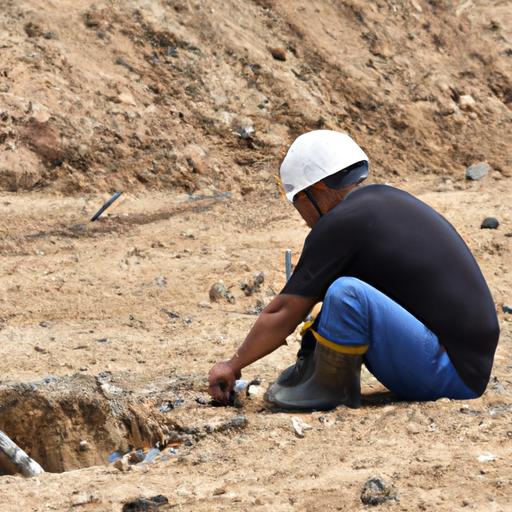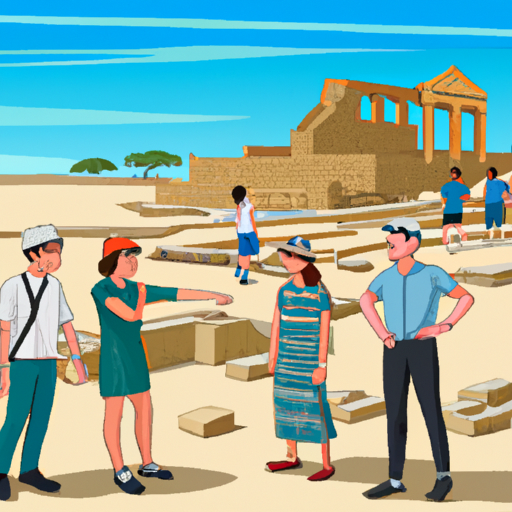Immerse yourself in the rich historical tapestry of Israel with a guided archaeological tour. Discover the remnants of ancient civilizations, unlock the secrets of their cultures, and delve into their intriguing mysteries. Our professional guide will lead you through significant archaeological sites, bringing history to life with captivating stories and insights.
"Unearth the Past": What Can We Learn from Archaeology?
Archeology is a fascinating field that allows us to dive deep into the mysteries of the past. Through careful excavation and analysis of artifacts and structures, we can uncover valuable insights about ancient civilizations and their way of life. It enables us to piece together the puzzle of history and gain a better understanding of our shared human heritage.
One of the main benefits of archeology is its ability to provide evidence and context for historical events and narratives. By studying ancient ruins, tools, pottery, and even human remains, archaeologists can reconstruct the daily lives, customs, and beliefs of past societies. This information helps us fill in the gaps in our historical knowledge and challenge existing assumptions or narratives.
Furthermore, archeology helps us trace the development and evolution of human civilizations over time. It allows us to see the progress and innovations made by ancient societies, as well as the challenges they faced. By analyzing how people adapted to their environment, interacted with other cultures, and organized their communities, we can gain valuable insights into our own cultural and societal development.
Archeology also plays a crucial role in preserving and protecting our cultural heritage. By excavating and documenting archaeological sites, we can ensure their preservation for future generations. Additionally, the knowledge gained from these excavations can help inform conservation efforts and guide the responsible management of cultural sites.

A professional guide demonstrating the proper technique to excavate an archaeological site.
Journey through Time: Which Ancient Civilizations Called Israel Home?
Israel is a land rich in history, with a diverse array of ancient civilizations that have left their mark on its landscape. From the Canaanites to the Israelites, from the Philistines to the Romans, Israel has been a crossroads of cultures and a center of power for numerous civilizations throughout the ages.
One of the earliest known civilizations to call Israel home were the Canaanites, who inhabited the region as early as the 3rd millennium BCE. They were skilled farmers and traders, known for their advanced agricultural techniques and their vibrant trade networks. The Canaanites were eventually absorbed into other cultures, but their influence can still be seen in the region's archaeological remains.
Another significant civilization in Israel's history is the Israelites. According to biblical accounts, the Israelites were a Semitic people who settled in the land of Canaan around the 12th century BCE. They established the Kingdom of Israel and left behind a rich cultural and religious legacy, including the Hebrew Bible. The Israelites faced numerous challenges, including conflicts with neighboring civilizations and eventual conquest by the Assyrians and Babylonians.
The Philistines were yet another ancient civilization that called Israel home. They were a seafaring people who arrived in the region around the 12th century BCE. The Philistines established five city-states along the southern coast of present-day Israel and had a significant impact on the region's culture and politics. They are most famously known for their conflict with the Israelites, particularly the story of David and Goliath.
"What Lies Beneath?": The Significance of Israel's Archaeological Sites
Israel's archaeological sites hold immense significance in uncovering the mysteries of the past. These sites provide a window into ancient civilizations, allowing us to understand their way of life, societal structures, and cultural practices. The excavations conducted in Israel have unearthed invaluable artifacts and structures that shed light on the historical context of the region.
One of the key reasons why Israel's archaeological sites are significant is their connection to biblical history. Many of these sites are mentioned in ancient texts such as the Hebrew Bible, providing tangible evidence that supports the stories and events described in these texts. For example, the discovery of the ancient city of Jericho corroborates the biblical account of its conquest by the Israelites.
Moreover, Israel's archaeological sites offer insights into the interactions between different civilizations throughout history. The region's location at the crossroads of Africa, Asia, and Europe made it a hub for trade and cultural exchange. Through excavations, archaeologists have discovered evidence of trade routes, ancient marketplaces, and the exchange of goods and ideas between civilizations.
In addition to their historical significance, Israel's archaeological sites also contribute to tourism and economic growth. Visitors from around the world are drawn to these sites, eager to explore the remnants of ancient civilizations and discover the stories they hold. The preservation and promotion of these sites not only provide educational and cultural experiences but also contribute to the local economy.

A group of tourists exploring the ruins of mesada tour, guided by an archaeologist.
Touching History: How Does Interacting with Ancient Artifacts Enrich Your Experience?
When visiting archaeological sites in Israel, one of the most captivating aspects is the opportunity to interact with ancient artifacts. The ability to touch and handle these objects from the past adds a layer of connection and intimacy to the experience. It allows us to bridge the gap between the present and the ancient world, creating a tangible link to those who came before us.
Interacting with ancient artifacts provides a sensory experience that goes beyond simply observing them from a distance. Feeling the texture of a pottery shard, running your fingers along the engravings of an ancient tablet, or holding a centuries-old coin in your hand brings the past to life in a unique way. It allows us to imagine the hands that crafted these objects and the people who once used them in their daily lives.
Furthermore, interacting with ancient artifacts can offer insights into the craftsmanship and skills of ancient civilizations. Examining the intricate details of a piece of jewelry or a carved stone sculpture not only showcases the artistry of the past but also invites us to appreciate the level of skill and dedication that went into creating these objects.
Additionally, the act of interacting with ancient artifacts fosters a sense of awe and wonder. It serves as a reminder of the vastness of human history and the enduring legacy of those who came before us. It sparks curiosity and encourages us to ask questions about the people, cultures, and societies that produced these artifacts.
A guided archaeological tour in Israel is more than just a journey through time. It's an opportunity to engage with the past, to learn from the wisdom of ancient civilizations, and to discover the roots of our present-day world. So, why not embark on an adventure that not only enriches your knowledge but also feeds your soul? Join us as we uncover the mysteries of our ancestors, one ancient artifact at a time.
